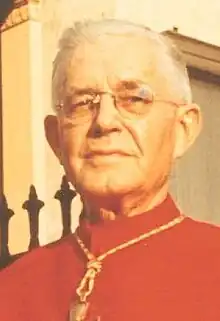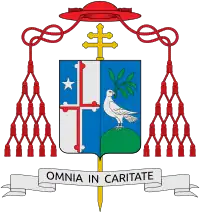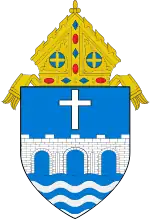Lawrence Joseph Shehan | |
|---|---|
| Cardinal, Archbishop Emeritus of Baltimore | |
 | |
| See | Baltimore |
| Appointed | July 10, 1961 (coadjutor) |
| Installed | December 8, 1961 |
| Term ended | April 2, 1974 |
| Predecessor | Francis Keough |
| Successor | William Donald Borders |
| Other post(s) | Cardinal-Priest of S. Clemente |
| Orders | |
| Ordination | December 23, 1922 by Giuseppe Palica |
| Consecration | December 12, 1945 by Amleto Giovanni Cicognani |
| Created cardinal | February 22, 1965 by Paul VI |
| Rank | Cardinal- Priest |
| Personal details | |
| Born | March 18, 1898 |
| Died | August 26, 1984 (aged 86) Baltimore, Maryland |
| Buried | Baltimore, Maryland |
| Previous post(s) | Auxiliary Bishop of Baltimore-Washington (1945-53) Bishop of Bridgeport (1953-61) Coadjutor Archbishop of Baltimore (1961) |
| Motto | Ominia in caritate (All things in love) |
| Styles of Lawrence Shehan | |
|---|---|
 | |
| Reference style | His Eminence |
| Spoken style | Your Eminence |
| Informal style | Cardinal |
| See | Baltimore |
Lawrence Joseph Shehan (March 18, 1898 – August 26, 1984) was an American prelate of the Roman Catholic Church. He served as archbishop of the Archdiocese of Baltimore in Maryland from 1961 to 1974 and was made a cardinal in 1965. Shehan previously served as an auxiliary bishop of Baltimore from 1945 to 1953 as bishop of the Diocese of Bridgeport in Connecticut from 1953 to 1961.
As bishop of Bridgeport, Shehan established new parishes and other facilities to meet the needs of the expanding Catholic population, working to create new ministries for Portuguese- and Spanish-speaking Catholics. As archbishop of Baltimore, he condemned racial discrimination in the archdiocese and participated in the American Civil Rights Movement. Shehan was one of the first Catholic prelates to condemn the Vietnam War. He was also a strong advocate for building ecumenical ties with the Protestant and Jewish communities.
Shehan's reputation has been tarnished by revelations in 2019 and 2023 that he mishandled sexual abuse allegations against clergy in both Bridgeport and Baltimore.
Biography
Early life and education
Lawrence Shehan was born on March 18, 1898, in Baltimore, Maryland, to Thomas Patrick and Anastasia Dames (née Schofield) Shehan.[1] Lawrence was one of five children. His father operated a tailors' supply business.[2] Lawrence Shehan received his early education at St. Ann's parochial schools in Baltimore.[3] By the eighth grade, he had decided to become a priest.[2]
In 1911, Shehan began his studies for the priesthood at St. Charles College, a college seminary in Ellicott City.[4] After graduating from St. Charles, Shehan enrolled at St. Mary's Seminary in Baltimore in 1917, earning a Bachelor of Arts in 1919 and a Master of Arts in 1920.[1][5]
In 1920, the Archdiocese of Baltimore sent Shehan to Rome to continue his studies at the Pontifical Urban University, where he received a Doctor of Sacred Theology in 1923.[4][5]
Priesthood
On December 23, 1922, Shehan was ordained a priest for the Archdiocese of Baltimore by Archbishop Giuseppe Palica at the Basilica of St. John Lateran in Rome.[6] Following his return to Maryland, the archdiocese assigned Shehan as a curate at St. Patrick's Parish in Washington, D.C., a post he held until 1941.[1] In addition to his pastoral duties, he served as assistant director (1929 to 1936) and director (1936 to 1945) of Catholic Charities in Washington.[4][5]The Vatican named Shehan as a papal chamberlain in 1939.[1]
In 1941, the archdiocese appointed Shehan as pastor of St. Patrick's Parish in 1941. He ended racial segregation at the St. Patrick's school in 1942 and regularly hosted meetings of the Washington branch of the Catholic Interracial Council.[7] The Vatican raised Shehan to the rank of domestic prelate in 1945.[1]
Episcopacy
Auxiliary Bishop of Baltimore
On November 17, 1945, Shehan was appointed auxiliary bishop of Baltimore and titular bishop of Lydda by Pope Pius XII.[6] He received his episcopal consecration on December 12, 1945, at Saint Patrick's Church in Washington from Archbishop Amleto Giovanni Cicognani, with Bishops Peter Leo Ireton and John Michael McNamara serving as co-consecrators.[6]
The archdiocese appointed Shehan as pastor of Saints Philip and James Parish in Baltimore in 1946.[1][4] In 1948, Archbishop Francis Patrick Keough named him as vicar general of the archdiocese.[4][1]
Bishop of Bridgeport
On August 25, 1953, Pius XII appointed Shehan as titular bishop of Lydda and as the first bishop of the newly erected Diocese of Bridgeport.[6] His installation took place on December 2, 1953.[6]
During his tenure in Bridgeport, Shehan established 18 new parishes, built 24 new churches, and founded three high schools.[8] He also formed a diocesan chapter of the Catholic Youth Organization, promoted vocations to the priesthood and religious life, and began parish ministry for the increasing number of Hispanic, Portuguese, and Brazilian immigrants.[8] In October 1960, Shehan convoked the first synod of the diocese to complete the initial organization of the diocese and to establish a uniform code of practice and discipline for the clergy.[8]
Coadjutor Archbishop and Archbishop of Baltimore
On July 10, 1961, Pope John XXIII appointed Shehan as coadjutor archbishop of Baltimore and titular archbishop of Nicopolis ad Nestum to assist Keough. When Keough died on December 8, 1961, Shehan automatically became the next archbishop of Baltimore.[6] Upon become archbishop, Shehan immediately published a pastoral letter condemning all forms of racial discrimination.[9] In early 1962, he outlawed discrimination in all archdiocesan institutions and events. That same year, Shehan created a Christian Unity Commission, said to be the first in the United States.[10]
In June 1962, the US Supreme Court ruled in Engel v. Vitale that public school administrators could not compose an official school and encourage students to recite it.[11] In response, Shehan warned that "secularization threatens to become a sort of state religion established by court decree".[12] That same year, Shehan banned racial segregation in the Baltimore Catholic School System. [13] He participated in the 1963 March on Washington, at which Dr. Martin Luther King Jr. delivered his I have a Dream speech.[14] In 1963, Shehan addressed the congregation at an Episcopal church in Baltimore and in 1965 did the same for a congregation in Baltimore synagogue.[10]
Shehan attended the four sessions of the Second Vatican Council in Rome from 1962 to 1965. Paul VI created Sheha as cardinal-priest of S. Clemente in the consistory of February 22, 1965.[15] During the fourth session of the Council in 1965, Shehan assisted Cardinal Leo Joseph Suenens in writing a closing message to artists on December 8, 1965.[16] [17] Within the Roman Curia, Shehan held membership in the Secretariat for Promoting Christian Unity.[14]
In March 1965, Reverend Gommar DePauw, dean of Saint Mary's Major Seminary in Emmitsburg, Maryland, founded the Catholic Traditionalist Movement (CTM). Gommar opposed many of the Second Vatican Council reforms and wanted to preserve the Tridentine Mass. Within a few weeks, Shehan order Gommar to disassociate himself from CTM. He refused to obey Shehan's order and moved to New York City. When Gommar ignored Shehan's order to move back to Maryland, the archbishop suspended Gommar's priestly privileges.[18][19]
In 1968, Shehan and Harry Lee Doll, the episcopal bishop of Maryland, founded the Ecumenical Institute at St. Mary's Seminary and University in Baltimore to further positive relationships between different religions.[20][21]
Considered a liberal in many of his positions, Shehan supported the theologian Reverend Charles Curran after he was fired in April 1967 from the faculty of Catholic University of America.[22] Shehan also advocated the abolition of housing discrimination based on race. He condemned American participation in the Vietnam War in 1971, terming the war "a scandal the Christian conscience can no longer endure."[9]
While in Australia in 1973, he celebrated a mass for Aboriginal Australians at the Sidney Myer Music Bowl in Melbourne during the 1973 Eucharistic Congress, drawing 20,000 attendees.[23]
Retirement and legacy
Shehan resigned as archbishop of Baltimore on April 2, 1974, have reached the mandatory retirement age of 75 for bishops.[6] He died of cancer in Baltimore on August 26, 1984, at age 86. He is interred in the Cathedral of Mary Our Queen.[10]
The Lawrence Cardinal Shehan Chair in Physical Medicine and Rehabilitation at Johns Hopkins University was established in 1993 by Good Samaritan Hospital of Maryland in Baltimore in honor of Shehan.[24] The Cardinal Shehan Center, a youth center founded in Bridgeport in 1962, is named after Lawrence Shehan.[25]
On October 1, 2019, former Connecticut state Judge Robert Holzberg issued a report on the handling of sexual abuse allegations against clergy by the Diocese of Bridgeport. The report accused Shehan, when he was bishop there, of transferring priests accused of sexual abuse without discipline.[26][27]
In April 2023, the Maryland Attorney General's Report on Child Sexual Abuse in the Archdiocese of Baltimore was issued. It accused Shehan of having failed to report several instances of clerical sexual abuse to the authorities despite having direct knowledge of the conduct from both victims and the parents of victims, as well as from other priests.[28]
- In the case of Reverend Joseph Maskell, Shehan had direct knowledge of Maskell's sexual abuse and yet "there is no indication that the Archdiocese took any investigative action as a result" of the reports of sexual abuse.[29]
- In the case of Reverend John Carney, he told investigators in January 2019 of informing Shehan of his sexual abuse of children. According to Carney, Shehan told him to "not talk about it."[29]
See also
References
- 1 2 3 4 5 6 7 Curtis, Georgina Pell (1961). The American Catholic Who's Who. Vol. XIV. Grosse Pointe, Michigan: Walter Romig.
- 1 2 Spalding, Thomas W. (1999). "Dissimilitude: The Careers of Cardinals Lawrence J. Shehan and John J. Krol". U.S. Catholic Historian. 17 (4): 50–63. ISSN 0735-8318.
- ↑ "Lawrence Cardinal Shehan Dies; Retired Archbishop of Baltimore". The New York Times. August 27, 1984.
- 1 2 3 4 5 Miranda, Salvador. "SHEHAN, Lawrence Joseph (1898-1984)". The Cardinals of the Holy Roman Church. Archived from the original on January 4, 2014. Retrieved May 11, 2010.
- 1 2 3 "His Eminence Lawrence Cardinal Shehan". Archdiocese of Baltimore. Retrieved December 18, 2023.
- 1 2 3 4 5 6 7 "Lawrence Joseph Cardinal Shehan". Catholic-Hierarchy.org. David M. Cheney. Retrieved January 21, 2015.
- ↑ "A Short History of St. Patrick Parish Saint Patrick's Church - Washington, D.C." St. Patrick Parish Saint Patrick's Church - Washington, D.C. Retrieved December 18, 2023.
- 1 2 3 Carney, Dan (October 19, 2015). "Past Bishops". Diocese of Bridgeport. Retrieved December 18, 2023.
- 1 2 "A Fighter Bows Out - TIME". web.archive.org. December 22, 2008. Retrieved December 19, 2023.
- 1 2 3 Pearson, Richard (August 27, 1984). "Cardinal Shehan of Baltimore Dies at 86". Washington Post. ISSN 0190-8286. Retrieved December 19, 2023.
- ↑ Engel v. Vitale, 370 U.S. 421 (1962)
- ↑ "Religion: On Second Thought.. . - TIME". web.archive.org. February 19, 2011. Retrieved December 18, 2023.
- ↑ Spalding, Thomas (1999). "Dissimilitude: The Careers of Cardinals Lawrence J. Shehan and John J. Krol". U.S. Catholic Historian. 17 (4): 53. JSTOR 25154690.
- 1 2 "DIED. Lawrence Shehan". Time Magazine. October 1, 2007. Retrieved December 18, 2023.
- ↑ "27 More Cardinals". Time Magazine. September 30, 2007. Retrieved December 18, 2023.
- ↑ Christus Rex. To Artists Archived April 3, 2007, at the Wayback Machine
- ↑ "COUNCIL CLOSING MESSAGES DECEMBER 8, 1965 - TO ARTISTS". Christus Rex. Retrieved December 19, 2023.
- ↑ "De Pauw's Departure". Time Magazine. June 23, 2008. Retrieved December 18, 2023.
- ↑ Cuneo, Michael W. (October 22, 1999). The Smoke of Satan: Conservative and Traditionalist Dissent in Contemporary American Catholicism. JHU Press. ISBN 978-0-8018-6265-6.
- ↑ "At 25, city's Ecumenical Institute seeks new inspiration, broader vision". The Baltimore Sun. October 11, 1993.
- ↑ "History of St. Mary's". Saint Mary's Seminary & University. Retrieved December 19, 2023.
- ↑ "Time for Boy Scouts? - TIME". web.archive.org. December 15, 2008. Retrieved December 19, 2023.
- ↑ ""Spiritual Olympics" in Melbourne". Time Magazine. February 7, 2008. Retrieved December 18, 2023.
- ↑ "Lawrence Cardinal Shehan Chair in Physical Medicine and Rehabilitation - Named Deanships, Directorships, and Professorships". Johns Hopkins University. June 28, 2016. Retrieved December 18, 2023.
- ↑ "About". Shehan Center. Retrieved December 19, 2023.
- ↑ Collins, Dave (October 1, 2019). "Report critical of church leaders' response to clergy abuse". The Chicago Tribune. Retrieved October 3, 2019.
- ↑ Knezevich, Alison (October 2, 2019). "Former Baltimore archbishop Cardinal Shehan transferred abusive priests in Connecticut, new report says". Baltimore Sun. Retrieved December 18, 2023.
- ↑ "'Day of reckoning': Report uncovers decades of sexual abuse within Archdiocese of Baltimore". WMAR 2 News Baltimore. April 5, 2023. Retrieved April 6, 2023.
- 1 2 "Redacted Report on Child Sexual Abuse in the Archdiocese of Baltimore is Released by Attorney General's Office" (PDF). Office of the Attorney General Maryland. April 5, 2023. Retrieved December 18, 2023.

